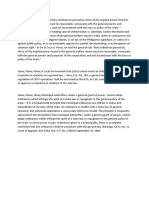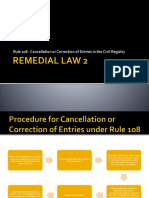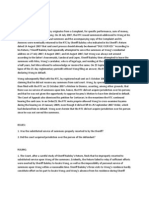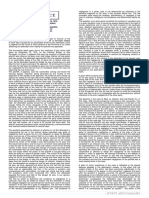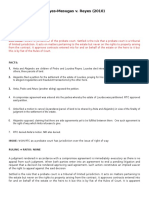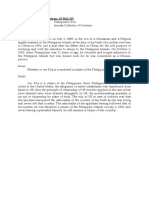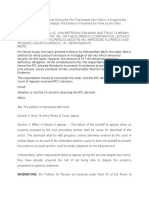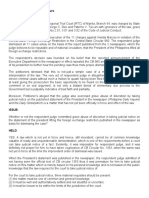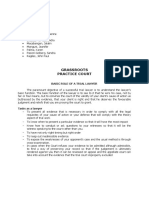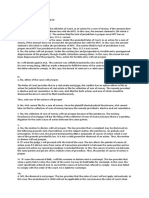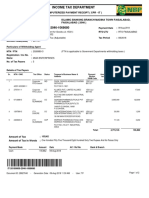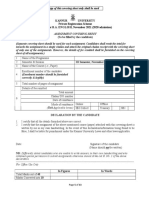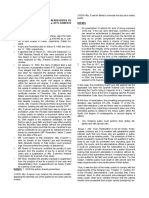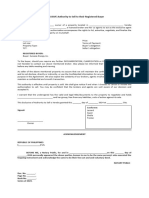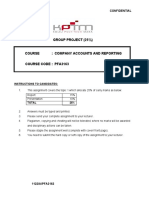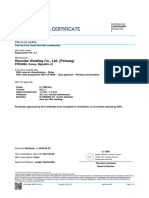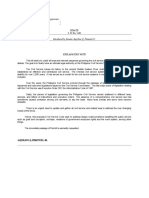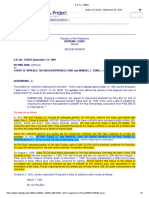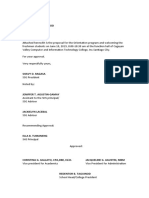Jose Paolo F.
Pastrana
Judge Agripino R. Bravo
Practice Court II
1. FALSE – Revised guidelines shall apply to criminal cases
2. FALSE – It is prohibited pleading
3. FALSE – it should be archived after 6 months
4. FALSE – Violative to the right of the accused to a speedy trial of his case.
5. FALSE – the court shall admit the plea of NOT GUILTY of the accused before arraignment and pre-
trial.
6. TRUE – PAG-IBIG can be subject to Philippines mediation center.
7. FALSE – The presentation of evidence shall be schedule on the date agreed upon.
8. TRUE – other pleadings are considered prohibited pleadings
9. FALSE – clarificatory procedure is not allowed since it was summary proceeding
10. FALSE – not at all times specially when there are specific rules provided therein.
11. TRUE – Jus Sanguinis or the nationality of the parents will apply.
12. FALSE – Notary public can only make the authorization to sign a person in behalf of the later but
to authorized himself is not proper.
13. FALSE – execution of a will has a strict rules to follow thus interim rules on remote notarization
will not apply
14. FALSE – the lawyer is not exempt from MCLE requirements unless he has 10 years’ experience in
practicing it.
15. TRUE – It may renew every three years
Page 1 of 7
�II
1. C
2. A
3. A
4. C
5. D
6. D
7. D
8. A
9. B
10. D
11. B
12. A
Page 2 of 7
� III
1 Dismissal of a criminal case if they determine that these should not go on to trial while acquittal of the
accused is always based on the merits that the defendant is acquitted because the evidence does not
show that the defendants’ guilt is beyond reasonable doubt.
2 Non bailable offense are persons convicted of a crime punishable by death or reclusion perpetua are
not bailable while bail not required as a general rule, no bail is allowed after the judgment of conviction
has become final, unless he has applied for probation before commencing to serve sentence, the penalty
and the offense being with the purview of the Probation Law.
3 The provisional dismissal of offenses punishable by imprisonment not exceeding 6 years or a fine of
any amount or both shall become permanent one year after issuance of the order without the case
having been revived while archiving of cases is when a criminal case may be archived only if after the
issuance of the warrant of arrest, the accused remains at large for 6 months from the delivery of the
warrant to the proper peace officer.
4 Formal offer means that the offering party shall inform the court of the purpose of introducing its
exhibits into evidence, to assist the court in ruling on their admissibility in case the adverse party
objects. While oral offer of evidence is presented through the testimony of a witness.
5 If a specific provision conflicts with a more general one in the same or an earlier statute, there is a
general rule that the specific provision prevails. However, the conflict must first be completely
irreconcilable as all words of an act should be given effect where possible.
6 A petition for relief may be filed on the following grounds, when a judgment or final order is entered
into, or any other proceeding is taken against the petitioner in any court through fraud, accident, mistake
or excusable negligence.
7 An oath is a verbal promise to tell the truth and nothing but the truth while a jurat is an
acknowledgment of the act of one who has executed a deed in going before some competent officer or
court.
8 Notarial register refers to a permanently bound book with numbered pages containing a chronological
record of notarial acts performed by a notary public. While notarial certificate is a written statement or
document that bears the notary’s signature and notary seal and affirms the facts or information being
attested to.
9 Direct contempt of court occurs when a party disobeys a court order in the presence of the court.
Indirect contempt of court is the violation of a court order outside immediate presence of the court.
10 Subjudice restricts comments and disclosures pertaining to the judicial proceedings in order to avoid
prejudging the issue, influencing the court, or obstructing the administration of justice. While principle
of open justice is that the court of justice shall always be open, except on legal holidays for the filing of
any pleading, motion or other papers, for the trial of cases, hearing of motions and for the issuance of
orders or rendition of judgments.
11 Counsel de parte is an attorney retained by a party litigant while counsel de officio is that the court
appoints a counsel for the litigants in order to represent him in his day in court.
Page 3 of 7
�12 It is when the lawyer stipulates with his client that in the prosecution of the case, he will bear all the
expenses for the recovery of things or property being claimed by the client and the latter agrees to pay
the former a portion of the thing/property recovered as compensation. Champertous contracts are
prohibited as they are against public policy and ethics of the profession. While the judicial affidavit shall
contain a sworn attestation at the end, executed by the lawyer who conducted or supervised the
examination of the witness.
13 Preponderance of the evidence is one type of evidentiary standard used in a burden of proof analysis.
While substantial evidence is an amount relevant evidence which a reasonable mind might accept as
adequate to justify a conclusion.
14 Sworn statement is a written statement of fact related to a legal proceeding while judicial affidavit
shall contain a sworn attestation at the end, executed by the lawyer who conducted or supervised the
examination of the witness, to the effect that he faithfully recorded or caused to be recorded the
question he asks and corresponding answer gave.
15 Mediation is a process wherein the parties meet with a mutually selected impartial and neautral
person who assists them in the negotiation of their differences while is a process whereby the judge
employs conciliation, mediation or early neutral evaluation in order to settle a case at the pre trial stage.
Page 4 of 7
� IV
1. When the offenses is punishable by imprisonment of not more than one year; the parties involve
who resides in the same barangay.
2. Practice of law means any activity in or out of court which requires the application of law legal
procedure knowledge training and experience.
3. Applicant must be Filipino Citizen, atleast 21 years of age, with good moral character, and a
Philippine resident
4. Disputes involving non-natural persons like corporations are not subject to the conciliation
proceeding of the Barangay Justice System.
5. Judge, clerk of court, interpreter, stenographer, fiscal
6. Marriage validity, labor dispute, civil status, and rape cases
7. Evidence is the means, sanctioned by these rules, of ascertaining in a judicial proceeding the
truth respecting a matter of fact. Its Scope. – The rules of evidence shall be the same in all courts
and in all trials and hearings, except as otherwise provided by law or these rules.
8. A document is considered original if the contents are the same and it is authenticated by the
authorized issuing body of the said document and a duplicate is just a mere copy of the said
original.
9. Parol evidence is an oral evidence, Parol evidence is admissible to show the existence of grounds
that would cause the contract to be void. Such grounds include illegality, fraud, duress, mistake,
and lack of consideration. And parol evidence is allowed to show evidence of lack of contractual
capacity.
10. Statement made for medical diagnosis, statement made under belief of imminent death, dying
declaration.
11. (1) A person is innocent of crime or wrong; (2) An unlawful act was done with an unlawful intent;
(3) A person intends the ordinary consequence of the person's voluntary act; (4) A person takes
ordinary care of the person's own concerns; (5) Evidence willfully suppressed would be adverse
if produced.
12. It is required in order to established the case.
13. Objection to evidence offered orally must be made immediately after the offer is made, and that
'Objection to a question propounded in the course of the oral examination of a witness shall be
made as soon as the grounds therefor shall have become reasonably apparent.
14. In order not to solicit order which is favorable to the person making such forum shopping.
15. The order in examination of a witness; is cross examination, direct examination re-direct and re-
cross examination.
Page 5 of 7
� V
1.
Yes. The latter committed on error is subject to appeal.
Under the rules of court which provides that an appeal can be resort if there is an error committed in the
decision of administrative body exercising quasi-judicial function.
Here, the arbitral tribunal exercises quasi – judicial function in which the parties committed error in
following the order can be subject to an appeal.
2. a
Yes. Client Y can terminate her counsel anytime
The law provides that a client has the authority to choose his own counsel with or without cause.
2b.
Yes. Atty. X can withdraw as counsel for client as long as it is allowed by the Cannons of Professional
Responsibility.
3a.
Yes. Atty. D is liable to his client. The lawyer should exercise his sworn duty to protect his client from
prejudicing the case based on technicalities. Failed to file his position paper in representation of his
client before the CA and therefore, he is liable.
3b.
Atty. D violates the Cannon of Professional responsibility which states that the lawyer shall not be
negligence in any legal matter entrusted to him.
4a.
Yes. Under the cannons of the code of professional responsibility provides that a lawyer shall upon his
client compliance with the laws and the principles of fairness
4b.
A lawyer shall not neglect a legal matter entrusted to him because he is liable in such negligence in
connection thereof.
5a
No. the contention of atty. B is without merit.
Page 6 of 7
�The laws and jurisprudence states that an attorney-client relationship commences from the time that a
representation was made on behalf of the client with regards to judicial proceedings.
5b.
Attorney – Client relationship is a fiduciary relationship which the lawyer must act in good faith, candor
and honesty in the exercise of his duty as a counsel for the client.
Page 7 of 7








